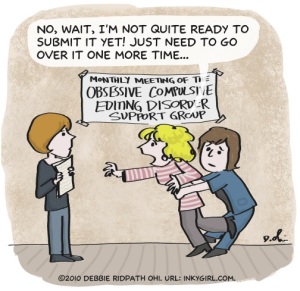The Backstory on Editing – Working with an Editor (first presented to the Romance Writers of Atlantic Canada by Nancy Cassidy, March 1, 2015), Part 2
Do You Need an Editorial Contract?
Some editors work without a formal contract, stating their terms on their website and leaving it at that. Others prefer a contract. Do you need one? That is up to you, and how much you trust the person you are giving your book to and their professional ethics. To see an example of a common contract, check out the link for the EAC contract example in Part 3.
This comes back to how to find a good editor. I have to say the best way is to talk to someone who has worked with a particular editor. Ask questions! Do not rely on advertisements. You may also want to check how an editor is rated and review some of the projects they have been involved with. Every editor has preferences for the kind of book they like to work with, even if they don’t admit it. Check their list of completed books and you can probably tell their main genres. (psst – I don’t do horror books!)
See further links in Part 3.
Getting Ready to Send to an Editor
There really isn’t much point in sending a book to an editor if it isn’t ready. You will waste your time and your money. You also don’t want to send something that you will be making wild, wide sweeping changes to, multiple times. Yes, your editor might suggest what seems like a major change, but you don’t want to pay to have them edit the book a dozen times. Only you know what your book is supposed to be, and until you reach that point you are wasting your money bringing it to an editor.
There are several steps to being ready to send to an editor.
- Have a firm vision in mind of what the book is, who it is for, and what it is meant to convey.
- Read through your book.
- Have another author or critique partner read through your book.
- Revise.
- Read through it again.
- Run a self edit. If your writing is clean you may reach the stage where you can work with only Structural edits and a proofread.
- Get ready for criticism. You may need to prepare yourself mentally for hearing things that are, at least on the surface, negative. Be open to changes and ready to take direction or to at least discuss it with your editor. (Personal note – I have had one client who completely rejected the edit I did for him. In the end I gave him his money back, because I could see he wasn’t ready for this step and his work was something I didn’t want to be associated with.)
- Draft a few notes on what you want your book to accomplish. Do you want to self publish? To submit to a particular publisher? This can change how an editor approaches a book. Also, is there some emotional point you want to stand out? A message for the readers? Be ready to tell your editor!
- Send it! There is such a thing as revising too much, too often! You can lose the focus of the book, and it is possible to have material critiqued too many times. You don’t want to hate the story too much!


